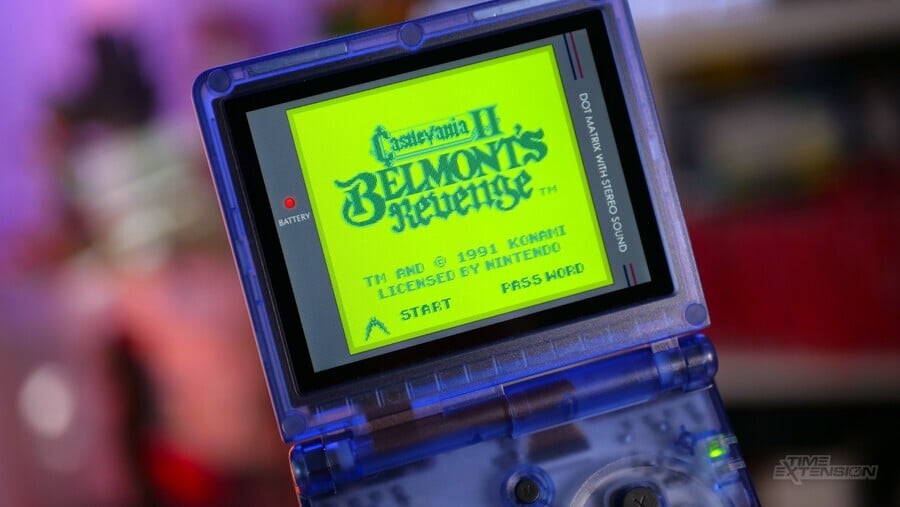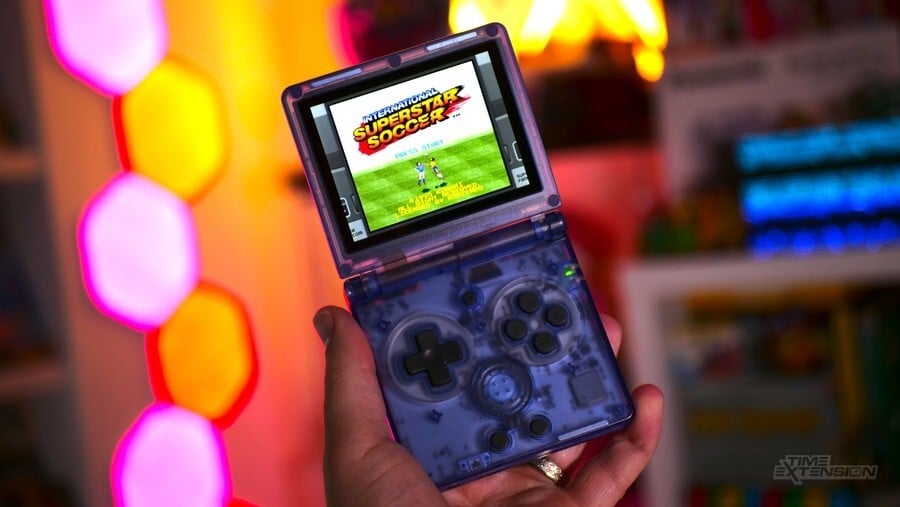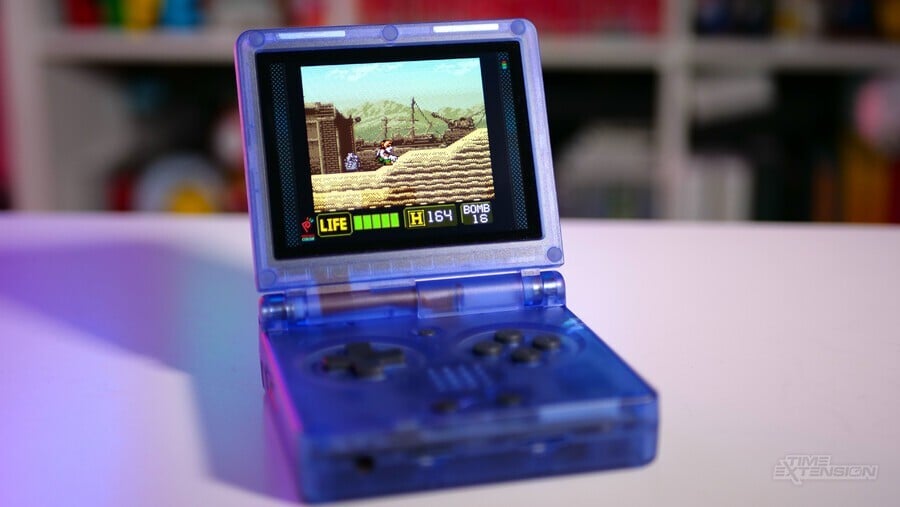Anbernic’s emulation-based handheld range has done a good job of paying tribute to some of the most iconic portables of all time, with the likes of the Game Boy, Game Boy Micro and Game Boy Color all being referenced in the design language of its products.
However, the shift to a clamshell-style device based on the iconic GBA SP feels like an evolutionary step, and one which has made the $70 RG35XX SP one of the most eagerly awaited Anbernic products so far.
Does this flip-top challenger really match Nintendo’s original device in terms of comfort, screen quality and overall desirability? Join us as we aim to find out…
Anbernic RG35XX SP Review: Design & Display

As we’ve already established, the RG35XX SP is a clone of the GBA SP in terms of design – although it’s worth noting that it’s not an exact match in terms of dimensions. It’s ever-so-slightly larger than Nintendo’s portable, and it’s thicker, too. However, it’s not like it’s worlds apart from the GBA SP – for example, it still fits in the official GBA SP carry case, even if it’s a little on the snug side.
Anbernic has also expanded the input side of things with the RG35XX SP. There are four action buttons instead of the two seen on the GBA SP, and you also have four shoulder buttons (which rattle quite alarmingly when you shake the console).
Above the physical controls there’s a ‘Menu’ button, which is used for exiting games and accessing options, such as save states and the like. The power switch has been replaced by a power button, which is accompanied by a ‘Reset’ key. On the other side, the volume slider seen on the GBA SP has been swapped out for a two-button rocker.
On the top edge of the device, there’s a USB-C port for charging and a mini-HDMI port, so you can connect the RG35XX SP to your HD TV. On the bottom edge, you won’t find a cartridge port – as is the case with the GBA SP – but instead, you’ll spot dual MicroSD card slots alongside a 3.5mm headphone jack (the latter of which was completely absent from the GBA SP).
The D-pad and buttons on the RG35XX SP feel great; the pad, in particular, is responsive and precise and is pretty solid when it comes to diagonal inputs – we didn’t have any issues pulling off fireballs in Street Fighter II, for example. Both the D-pad and buttons have more travel than the shallow ones on the original GBA SP, which is a vast improvement, in our opinion. The only issue with all of these inputs is that they are accompanied by some very loud clicking sounds, which might be off-putting to some people.
Those of you who recall the GBA SP will remember that the initial AGS-001 model came with a pretty terrible front-lit screen; Nintendo would later release the AGS-101, which adopted a far superior back-lit panel. Indeed, the AGS-101 is seen as the gold standard when it comes to GBA displays – yet the 3.5-inch, 640×480 pixel IPS screen found on the RG35XX SP blows it out of the water in terms of colour, brightness, viewing angles and contrast.
Anbernic RG35XX SP Review: Software & Performance

The RG35XX SP is running a Linux-based OS, and, as is often the case with Anbernic’s emulation handhelds, the stock software has some issues.
For example, to a casual user, it might be assumed that the ‘Game Room’ menu is the best option for running emulators – however, the overall performance is pretty dire across the board. Instead, you should stick with the RetroArch menu, which leverages the popular multi-system emulation front-end to deliver a far more convincing experience.
We really love the fact that many of the emulators include screen borders, which ensure a pixel-perfect aspect ratio, and that filters come pre-applied (the Game Boy one is especially good, as it does a wonderful job of replicating the pea-soup pixel-grid look of the 1989 handheld). The GBA emulator comes with a border which shows the Game Boy Advance logo at the bottom, delivering the 3:2 aspect ratio and making it look even more like the real deal.
When it comes to performance, the Allwinner H700 chipset is more than capable of emulating most retro systems without any issues. Mega Drive, SNES, PC Engine and many others are supported and run brilliantly, but it’s arguably the Game Boy consoles which look best on this device, given the nature of its inspiration. PS1 emulation is also great, but things start to fall apart when you reach the Dreamcast, N64 and PSP.
The most obvious issue emulating these consoles on the RG35XX SP is the fact that it lacks an analogue stick, rendering some games unplayable. Beyond that, there are performance issues when emulating PSP games, too. While it’s great that the device is powerful enough to host these machines, we wouldn’t recommend buying one with the express purpose of playing them.
The battery life on the RG35XX SP is a welcome surprise. If you’re running anything prior to the 32-bit generation of systems, then you can expect to get well over the typical average of around five to six hours per charge, which is what we’re used to seeing with most emulation handhelds. We managed to get around seven to eight hours during our review period, which is fantastic.
On the downside, the RG35XX SP’s sleep function is a little broken right now. The idea is that you can shut the lid during gameplay, and the device will hibernate until you open it up again – but it’s so inconstant that it’s impossible to have much confidence in it. This is hopefully something that will improve as Anbernic rolls out system updates, and, as is always the case with these devices, it’s worth noting that third-party OS replacements are already available which handle things like ‘sleep mode’ much better.
Anbernic RG35XX SP Review: Conclusion

The RG35XX SP really does feel like one of Anbernic’s most accomplished products yet. We adore the design, the screen is fantastic, and it does a brilliant job of emulating systems like the Game Boy, GBA, SNES, PS1 and more. Battery life is also exceptionally good, and the updated controls are brilliant.
It’s not perfect, though. The clicky buttons are off-putting, and the lack of an analogue stick causes headaches when emulating consoles like the N64 and Dreamcast. The stock OS also needs some additional time in the oven, but this is often the case with Anbernic devices; the sleep mode, which could have been a really useful feature, is so half-baked you’ll end up ignoring it.
Even when taking these shortcomings into account, there’s no denying that the RG35XX SP is one of the best emulation handhelds we’ve seen in quite some time – and much of that is down to the console which inspired it, the GBA SP.
The iconic clamshell’s influence can be felt everywhere on this product, so while Anbernic can hardly be credited with coming up with the idea, it can at least rest easy in the knowledge that it has imitated one of the best in the business. If you’re looking to pick up a GBA console and aren’t bothered about using physical carts, then you might be best off saving your money and grabbing one of these instead.
Thanks to Keep Retro for sending the RG35XX SP used in this review.

